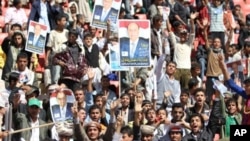Yemenis are heading to the polls in an uncontested presidential election that is part of a negotiated end to the decades-long rule of President Ali Abdullah Saleh.
In a country long-dominated by one man, there is a new face on the scene. After nearly 34 years, Ali Abdullah Saleh is on his way out, and Abed Rabbo Mansour Hadi is set to become president. But the face plastered on posters all over the capital is not unfamiliar. Hadi is the current vice president, Saleh's handpicked successor, and the sole candidate in Tuesday's election.
For the protesters who brought the Arab Spring to the southern reaches of the Arabian Peninsula, this continuation of the old establishment is not what they envisioned. Adel Arabaei, a leading youth activist, says he considers it one of the stages of Yemen's political crisis. But it is not, he adds, directly tied to the youth movement, which wants a complete change of the system.
Watch related video after attackers in Aden blew up polling station
But even an imperfect election during this crisis is being seen as a milestone. After a year of a popular uprising that devolved into tribal fighting and invigorated the local al-Qaida branch, most people just want to find some sense of normal.
That is not easy in Yemen, the poorest country in the Arab world. Sana'a is set to become the world's first capital to run out of water. It is in such short supply that some pay a fifth of their income to get it.
Electricity is available, at best, a few hours a day. Generators are essential, but the price of fuel to run them has spiked, along with other basic commodities.
The economic hardships are just part of the daunting challenges in setting up this special election.
Yemen High Electoral Commission Judge Yehia Mohamed al-Riany says colleagues have been assassinated trying to carry out their work in areas hostile to the vote, in rebel-held parts of the north and in separatist areas in the south.
Al-Riany says every citizen has the right to either vote or abstain, but no one has the right to act in violation of the law.
Yemen Elections Photo Gallery
For now, many Yemenis seem to be content to vote in an election that ushers in a transitional period. In the narrow alleyways of Sana'a's old city, silversmith Mohamed al-Saqal says there is a new optimism.
He says a year ago, people were desperate, but now, after these elections, Marshall Hadi will lead the country on a very successful path.
“Very successful” might be too much to hope for, but at least, say many, the election offers some kind of path.
| Join the conversation on our social journalism site - Middle East Voices. Follow our Middle East reports on Twitter and discuss them on our Facebook page. |




